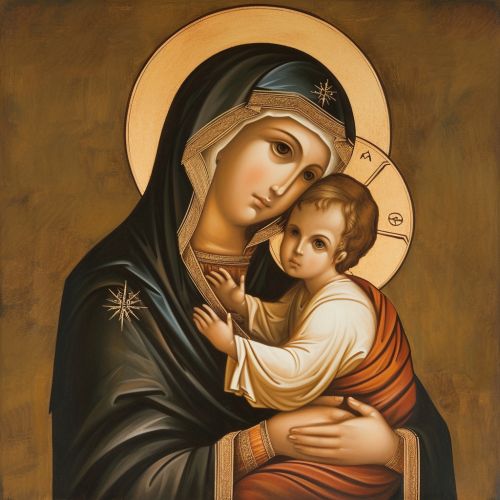Theotokos
Overview
The term "Theotokos" (Greek: Θεοτόκος, literally "God-bearer") is a title of Mary, mother of Jesus, used especially in Eastern Orthodox, Oriental Orthodox, and Eastern Catholic theology. The term is an important one in the Christological debates of the 4th and 5th centuries AD.


Etymology and Translation
The term "Theotokos" is a compound of two Greek words: Θεός ("Theos", meaning God) and τόκος ("tokos", meaning childbirth, parturition; by extension, offspring). Hence, the literal translation is "God-bearer" or "the one who gives birth to God." However, the term has been variously translated into Latin as "Deipara" and "Mater Dei", both of which carry slightly different implications.
Historical Use and Development
The term Theotokos was first used in the 3rd century AD and gained widespread use after the Council of Ephesus in 431 AD, where it was declared an official term of reference for Mary. The council affirmed that Mary could indeed be referred to as "Theotokos" because her son Jesus is one person who is both God and man, divine and human.
Theological Implications
The use of the term Theotokos was and remains significant in establishing the full divinity of Jesus. By calling Mary the "God-bearer", the church affirms that the Jesus she bore was fully God from the moment of his conception. This has important implications for understanding the Incarnation, the Christian belief that God became human in Jesus.
Controversies
The use of the term Theotokos was not without controversy. The most significant of these controversies was the Nestorian controversy in the 5th century. Nestorius, the Patriarch of Constantinople, objected to the use of the term Theotokos, arguing that it compromised the distinction between Christ's human and divine natures. This controversy led to the Council of Ephesus, where Nestorius' views were condemned.
In Liturgy and Devotion
The term Theotokos is frequently used in the liturgy and devotional practices of the Eastern Orthodox, Oriental Orthodox, and Eastern Catholic Churches. It is often used in hymns, prayers, and icons, and is a common focus for personal and communal devotion.
